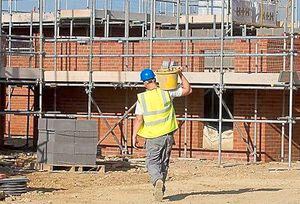Is Help to Buy selling us short? Nigel Hastilow
When a friend claimed his daughter faced a £20,000 loss on the sale of her first home in Telford, I didn’t believe him.

It represented a 10 per cent drop in the value of her home in a town where house prices rose five per cent last year and nine per cent since 2014.
But it turns out he was right – thanks to the Government’s Help to Buy scheme which is meant to make owning a home easier for young people.
But if you trawl through Rightmove’s lists of house sales, and the prices paid, you discover the value of homes which were brand new a couple of years ago have actually fallen.
There are plenty of examples of ‘new build’ homes which, when their first owners move on, change hands for a lot less than the original cost.
A two-bedroom end of terrace new build sold for £139,995 in 2015 and has just been bought for £136,00. Similar losses can be found on many homes when they change hands for the first time.
A terraced house went for £142,000 in September which cost £154,000 new. Another sold for £125,000 in July even though it changed hands for £139,000 in March. A three-bedroom semi went for £140,000 in January which cost £143,200 new.
And it’s not just in Telford where the buyers of new homes are losing out. In Dudley, for instance, a new home sold in 2008 for £240,000 – at the height of the property bubble. In September, it changed hands for £186,000.
A 2013 new-build cost £170,995 and went in May for £170,000. But another, a terraced house, went for £165,000 second-hand in May when it cost £179,000 new.
In Wednesbury you can find a flat in which cost £88,500 new in 2011 and sold for £80,00 in March. Another flat £127,250 new in 2007 and went for £90,000 this February.
A new semi-detached sold for £160,500 in 2006 and re-sold in March for £130,000. There are not a huge number of new build homes which have been sold and, to be fair, some do make a profit.
New homes bought well over 10 years ago are selling at healthy prices, so it may be to make a profit you have to hang onto your property for a while. What all this shows, is that the Government’s help-to-buy scheme, introduced by George Osborne when he was Chancellor in 2013, may be doing more for property developers’ profits than for first-time-buyers.
It’s certainly true that building companies are making money hand over fist. There is a shortage of houses so they can charge top rates for anything they put on the market. By limiting the supply of new homes, while demand continues to grow, many young people would be priced out of the market if it were not for Government help.
And the deals on offer look attractive if you’re a young couple hoping to get a foot on the ladder.
For every £200 you save in a Help to Buy ISA, the Government bungs in another £50. Better still, the Government will lend you 20 per cent of the purchase price, interest-free for five years. But only on new homes.
Barratt, the country’s largest home-builders, says average selling prices have risen 5.9 per cent and it expects profits to increase by 12 per cent to £765 million.
Bankers Morgan Stanley say: ‘Help to Buy, and broader house price inflation, among other things, have helped housebuilder earnings triple since its launch.’ About 120,000 houses have been sold under Help to Buy since 2013 and it’s proving very popular with young people.
But, while builders have been criticised for inflating the price of their new houses to exploit the Government’s generosity, few people take into account the longer-term impact on the buyers.
Of course the value of a house can fall for many reasons. A repossession, for instance, is invariably sold at a knock-down price. A home which is allowed to deteriorate loses value.
An urgent need for a quick sale might explain a bargain price. But in all likelihood Help to Buy has stoked up prices on to the point where, in reality, new homes are simply too expensive. Eager buyers do not necessarily look two or more years into the future and consider the re-sale value.
We’ve come to believe that home-buying is a one-way bet, a sure thing, a certainty. The idea that you might lose money from owning a home is not something we are even prepared to entertain.
Yet Help to Buy is inflating a bubble which may well burst. In her inaudible Conservative Party conference speech, Theresa May promised to pour another £10 billion into Help to Buy – Chancellor Philip Hammond will be re-announcing this in his Budget on Wednesday.
On the face of it, this is a reasonable attempt to give young people a better chance of owning their own homes. In reality, though, it could become as much of a con as student loans are.
There must be a way of boosting home ownership without lining the pockets of property developers by allowing them to fleece first-time buyers. Unfortunately Help to Buy isn’t it.





